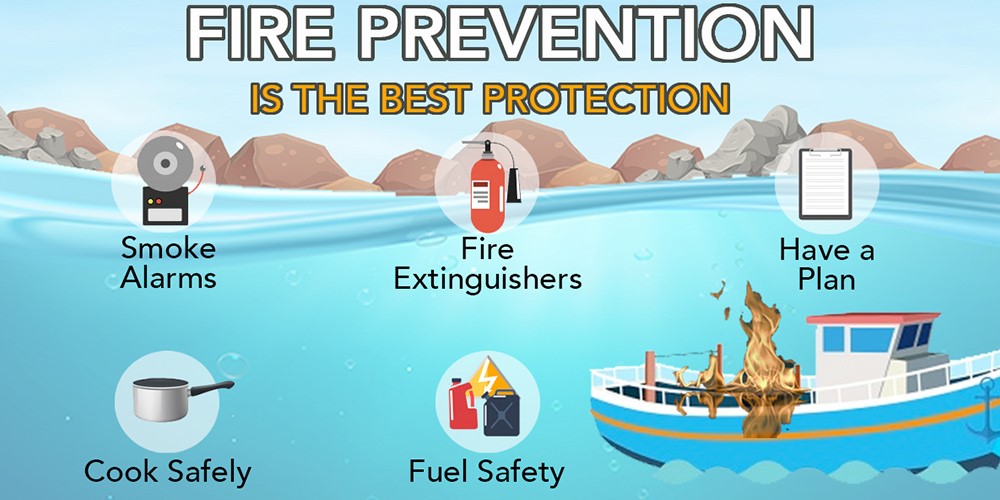
Fire Safety
When a fire on board a boat fully takes hold, it’s extremely unlikely that it can be tackled successfully. That’s why it’s so important to observe good fire safety practices, which minimises the risk of a fire occurring. As with all things in life – prevention is far better than cure.
Fire needs three elements to take hold: Oxygen, A combustible material of some kind (such as fuel) and a source of ignition (heat). To extinguish it, the fire needs to be permanently deprived of one or more of these. How to do this depends on what type of fire it is: using the wrong method to extinguish a fire can only make the situation worse.
Smoke from a boat fire will affect the ability to breathe, a sensation similar to drowning. With two to three breaths of toxic smoke the boat user could be unconscious. A working smoke and separate carbon monoxide alarm of the right type can warn very quickly of the danger and buy precious seconds to escape.
Basic safety
If in doubt, don’t fight a fire yourself. Get out, stay out and call 999
- Do not enter a smoke-filled space.
- If you are already in a smoke-filled space keep low down where the air is clearer.
- If you need to break glass to escape use a blanket to prevent injury.
- Starve the fire of air. Don’t open engine hatches or doors unless you have to.
Check your equipment
Whether you’ve been out on your boat recently or not, it’s important to take some time and complete basic checks and maintenance. Primarily fuel and fuel lines, together with ensuring that all safety equipment is functional and in good order.
Alarms
Alarms save lives. Fire can spread quickly on a boat, even on water. Alarms can help keep your crew safe. Advice on choosing alarms suitable for boats, including a current list from the manufacturers, can be found here.
Smoke Alarms
- Optical sensor alarms with hush buttons and ‘sealed for life’ batteries are best for boats.
- Fit alarms in places you will hear them clearly if they go off
- Consider installing linked alarms that will go off at the same time
- Test the alarm when you board and regularly when aboard. Never disconnect it or remove working batteries
Gas leak indicators
- Fit a bubble type gas leak indicator in the LPG cylinder locker
- Push the gas leak indicator test button routinely to check for leaks in the gas system
Carbon monoxide (CO) alarms
- Fit a CO alarm to alert you of any poisonous carbon monoxide
- Check your CO alarm is suitable for marine use and meets the required standards
Fire blankets and extinguishers
To extinguish a small fire, or to help you escape safely, consider using an extinguisher.
- Familiarise yourself with how to use any extinguishers on board.
- Only consider tackling a fire with an extinguisher if you are confident how to use it. If in doubt, evacuate the boat.
- Keep fire blankets and extinguishers within easy reach, close to exits and risk points, such as the galley and engine area.
- Check extinguishers on a regular basis for serious dents, leaks and loss of pressure.
- Check the pin and firing mechanism for any signs of problems or weaknesses.
- Check the dates on extinguishers and fire blankets and service or replace them as recommended by the manufacturer’s instructions.
- Only choose extinguishers that carry recognised approval marks.
Download the Gov.UK information leaflet here
Preventing a fire:
- Never leave cooking unattended – turn appliances off properly when no one is using them.
- Never use a BBQ on board – not only are they a fire hazard they are also a source of Carbon Monoxide.
- Keep flammable materials away from naked flames, cigarettes/pipes, light bulbs, flues and other sources of heat.
- Only use the fuel recommended by the heater manufacturer – other types may burn too hot.
- Do not use damp fuel – this can lead to a build up of flammable tar in your stove and chimney.
- Dispose of cigarettes carefully, make sure they are out.
- Use a stable ash tray and regularly empty it.
- Do not leave candles unattended.
- Ensure gas appliances are installed and maintained by trained fitters.
- Replace gas hoses showing sign of deterioration.
- Where possible close gas valves at night and when away from the boat.
- Store gas cylinders securely and outside.
- Check for the British or European Electrical safety mark when buying electrical goods.
- Always get a trained marine electrician to install and service electrics.
- Do not overload adapters.
- Unplug appliances when not in use.
What to do if you find a fire
Once a fire has been detected, everyone on board should know what to do.
Have an emergency plan
- Make sure you have an emergency plan and that everyone knows what needs to happen in the event of a fire.
- Make sure people know how to close emergency valves and switches in case of fire.
- You are more at risk from a fire when asleep, so check your boat before you go to bed. Make sure cooking and heating appliances are off and candles and cigarettes are fully extinguished.
- Keep a torch easily available to help you escape at night. Make sure you have spares and test them regularly.
- Don’t go to sea without a VHF radio. Have a charged-up, handheld, waterproof one ready for use at any time.
- Don’t rely on a mobile phone. There could be no signal and it may not be waterproof.
- Have enough life jackets for everyone on board and keep them in good condition.
- Keep exits clear and keys to hand. Don’t lock or bolt doors and hatches from the outside.
- Track your location so you can tell the emergency services where you are if needed.
- Consider having a ‘grab-bag’ for removing vital possessions in an emergency.
Types of fire
The different types of fire have been classified into groups which are distinguished by a letter:
- A are fires involving solids such as paper, wood, bedding etc
- B are fires involving liquids such as oil and petrol
- C are fires involving gases
- D are fires involving metals
- F are cooking oil and fat fires
Electrical fires are not included within this list as once the electrical source has been isolated the combustible material fuelling the fire will fall into the categories above.
Inland fires
If you are inland or moored near to land move everybody off the boat and call 999 immediately.
Fires at sea
If you are off-shore move as far away from the fire as you can on deck. Get everybody into life jackets.
Take a handheld VHF radio onto deck with you to call for help.
Notify the Coastguard by radio, make a Mayday call and/or display a distress signal.
Protecting the inside of your boat
Cigarettes
Dispose of cigarettes carefully. Put them out, right out.
- Keep cigarettes or pipes away from anything that could catch fire, such as curtains.
- Never smoke when refuelling or changing a gas cylinder.
- Use a proper ashtray that will stay stable on the boat.
- Take extra care if you smoke when you’re tired and never smoke in bed.
- Empty ashtrays regularly. A build-up of ash could catch fire.
Furnishings
- Try to choose furniture that carries the fire-resistant label
- Keep fabrics and paper away from anything hot like hobs, flues and light bulbs.
- Watch out for domed-decklights focussing light rays and causing heat damage or fires in strong sunlight.
Candles
- Take extra care with lit candles. Don’t leave them unattended
- Only use secure holders, as a rocking boat or sudden jolt could tip candles over.
Safe Cooking & Heating
- Turn cooking appliances off properly after use
- Never leave cooking unattended. Turn things off until you come back
- Take extra care when cooking with oil – it sets alight easily
- Avoid cooking when tired. Remember, prescription drugs and alcohol can cause drowsiness
- Keep the cooking area clean for safety – a build-up of grease could catch light
- Spark devices are safer than matches or lighters to light gas cookers, because they don’t have a naked flame
- Only use portable appliances onshore and don’t change gas canisters inside the cabin or covered areas
- BBQ’s shouldn’t be used on boats – how charcoal gives off dangerous amounts of CO and blown embers could set your boat alight
- Keep cabin ventilation clear to prevent a build-up of toxic CO
- Try to keep fabrics away from cooking hobs to prevent them from catching fire
- Damaged stoves and flues could burn too hot; check adjacent areas for heat damage. Have your chimney swept regularly
- Only use the fuel recommended by the heater manufacturer. Other types may burn too hot
- Dispose of embers carefully. If they’re still warm they could cause a fire or build-up of CO
- Ensure all hobs burners have a flame supervision device to shut-off gas if the flame is blown out
Fuel and power safety
Make sure you check and maintain your boat’s fuel, gas and electrical systems on a regular basis.
Engine maintenance
- Don’t let oil or debris build-up in the bilges.
- Inspect surfaces and items adjacent to exhausts for signs of heat damage or charring.
- Check exhaust systems of inboard engines for leaks.
- Check for loose fuel joints, damaged fuel tanks or deteriorating hoses.
Fuel safety
- Take care when refuelling. Put out naked flames first. Turn off the engine and cooking before handling any fuel.
- Prevent petrol vapour from entering the boat by closing the doors, windows or hatches and closing the awning.
- Refuel outboard engines and generators well away from the boat.
- Leaks, spills and vapour can ignite easily. Clean them up straight away and make sure filler caps are secure after refuelling.
- Only carry spare petrol if necessary and store it in a self-draining locker or on open deck.
- Generators should be stored outside the cabin space when not in use.
Have appliances properly installed and serviced routinely by competent fitters.
Gas safety
- Never restrict airflow by blocking vents or air gaps.
- Make sure gas cylinders are secure after they’ve been changed. Test for leaks with detection fluid.
- Whenever possible, turn gas valves off before you go to bed or leave the boat.
- Replace gas hoses showing signs of cracking, bitterness or discolouration.
- Store gas cylinders outside, in a self-draining and fire resistant locker. Keep them upright and secured from moving.
Electrics
- Check for the British or European safety mark when buying electrical goods.
- Don’t overload adaptors. Keep to one plug per socket. Use the right fuse or circuit breaker to avoid overheating.
- Unplug appliances when they’re not in use or when you leave the boat.
- Damaged wires can overheat rapidly, so look out for scorch marks or burning smells.
- Take extra care when reinstalling the boat’s batteries. Check straps or restraints are secure afterwards.
